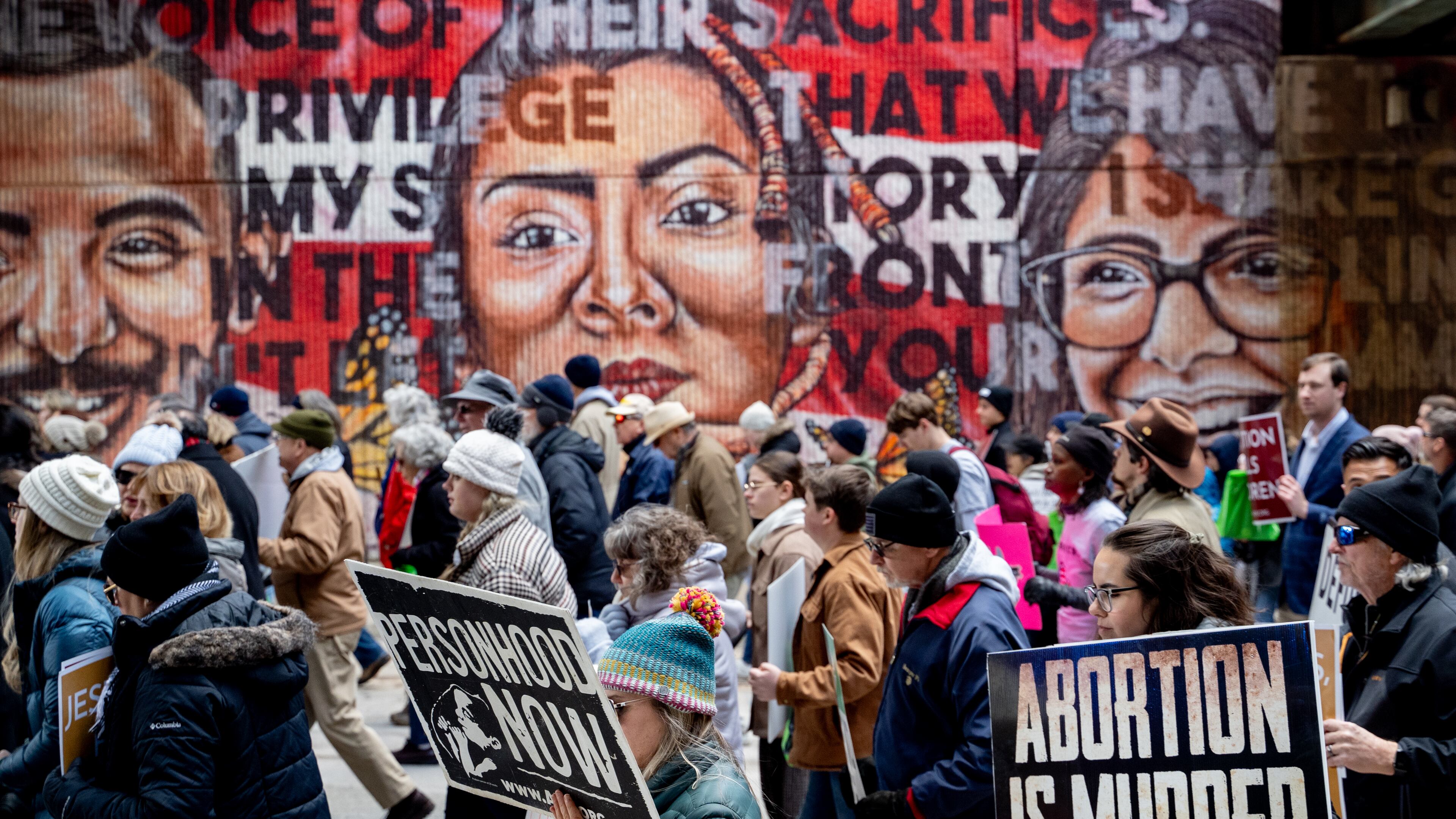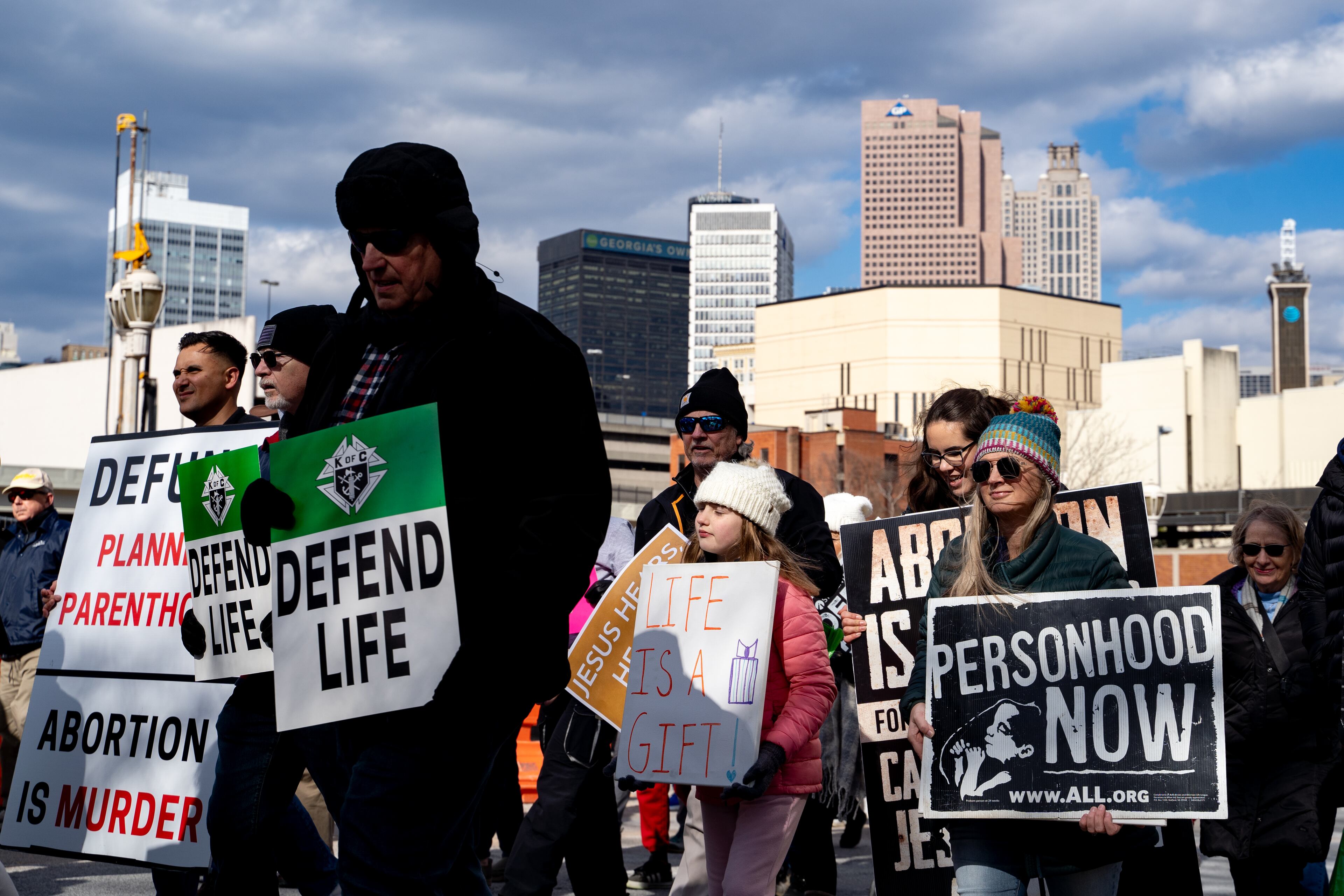Georgians mark abortion ruling anniversary in vastly different ways

Roe v. Wade may no longer be the law of the land, but that doesn’t mean advocates on either side of the issue are slowing down the fight for what they believe is right.
On Friday, Georgia Right to Life held its annual Stand for Life memorial and silent march starting from Liberty Plaza in downtown Atlanta to honor the lives they say have been lost to abortion since the 1973 Roe v. Wade ruling. The night before, Planned Parenthood Southeast Advocates held their annual Roses for Roe fundraiser in Midtown, which celebrated the event’s 10th year.
Both annual events are typically held within days of each other. That’s not a coincidence. Tuesday would have been the 52nd anniversary of the U.S. Supreme Court ruling that guaranteed a nationwide right to abortion. A 2022 ruling in Dobbs v. Jackson Women’s Health Center now allows states to regulate abortions.
Georgia Right to Life Executive Director Zemmie Fleck said she viewed the 2022 ruling a step forward in the fight to end abortion, but not the organization’s end goal.

Georgia law bans most abortions once a medical professional can detect fetal cardiac activity, which is typically around six weeks of pregnancy and before many know they are pregnant. The law allows later abortions if the life of the mother is in danger, if there is a fatal fetal anomaly or if the pregnancy is the result of rape or incest and the victim has filed a police report. It took effect in July 2022, weeks after the Dobbs ruling. Georgia Right to Life’s mission is to end all abortions beginning at conception and without exceptions.
“The goal of Georgia Right to Life is to eventually see a passage of a state constitutional amendment that would protect the personhood of all innocent human life from its earliest beginnings to natural death,” she said.
“Personhood” is a movement in anti-abortion circles to grant rights to zygotes and embryos from conception. Georgia’s law includes a “personhood” provision that requires, for example, embryos to be included in the state’s population count.
Fleck said she also seeks to highlight that her organization’s focus is not just abortion.
“It really is just not the singular abortion issue. It’s a life issue,” she said. “It’s protection of all life in whatever stage it is. So there’s a lot of end of life stuff that happens that is very, very concerning in our state.”
Fleck said Georgia Right to Life is not pushing any specific legislation around end-of-life regulations, but would support anything that limits the practice.
In Midtown, nearly 500 people gathered at The Temple to raise money for Planned Parenthood, which organizers said was a record attendance. The organization has been at the forefront of fighting for abortion rights for decades, making it a frequent target for anti-abortion groups and lawmakers. It also provides other services — such as cancer screening, prenatal and postpartum care, and wellness checkups — at a lower price than many private medical providers.

Planned Parenthood President Federation of America President and CEO Alexis McGill Johnson said the organization is bracing for what may come out of emboldened Republican-controlled legislatures after President Donald Trump’s win last fall. Despite what Republicans have said, McGill said, Trump does not have a mandate to shape policy.
“What I do think is happening across the country is they’re waiting for a signal from the Trump administration on where they’re going to pursue their agenda related to restrictions. We already saw them take down the ReproductiveRights.gov website,” she said. “So we anticipate that (at the federal level), where they move, the legislation will rise to meet it. I think that’s what we have seen consistently; that many of the bans in states like Georgia and Texas and now Alabama are often test cases used to figure out where they will test them and then export them into other states.”
Republican leaders in Georgia say they don’t expect to further restrict abortion in the near future and instead prefer to wait until a challenge of the law in state court is settled. The SisterSong Women of Color Reproductive Justice Collective and other abortion rights activists and providers sued the state in 2022, saying the law violated a woman’s right to privacy under the state’s constitution. The Georgia Supreme Court is expected to hear arguments in the case sometime this year.
Lawmakers say they also don’t plan to clarify the state’s abortion laws in this year’s legislative session despite the death, first reported last year, of a Georgia woman from post abortion complications. Medical professionals have said the law is difficult to interpret and that difficulty contributed to the death.
Nonprofit news organization ProPublica reported last year that two Georgia women died from complications after receiving abortions, both of which the state’s maternal mortality review committee had deemed to be “preventable.” In one case, after Amber Thurman’s abortion did not complete, doctors waited for 20 hours before performing surgery out of fear of violating state law. Another woman, Candi Miller, died after ordering abortion pills online and opting not to go to a hospital when she started having complications because family said she was afraid she could face criminal charges for having an abortion.
That prompted the state’s Department of Public Health to clarify that providing lifesaving treatment to pregnant women doesn’t violate the law. The state told health care facilities and providers that the law does not require death of the mother be imminent for a doctor to determine a medical emergency exists.
The law says abortions may occur if a pregnancy is “medically futile,” but doctors have said that is not a medical term and it’s unclear whether the child must be likely to die at birth, within an hour or months later. The law’s exception for a “medical emergency” is also difficult for doctors to interpret because there is no clear line determining when a person is at risk of death.
Jaylen Black, a spokeswoman with Planned Parenthood Southeast Advocates, said the organization will also be looking out for what she referred to as “partisan ploys” as some Republican lawmakers begin testing out their chances at running for higher office in 2026.
“We’ll be looking for room where we can partner, but we’ll also have to stay firm on, ‘we have to repeal this abortion ban,’” she said. “Clarifying exceptions? We can talk about it. We can find some room for negotiation. But at the end of the day, you can’t say your exception is working if women are dying.”



